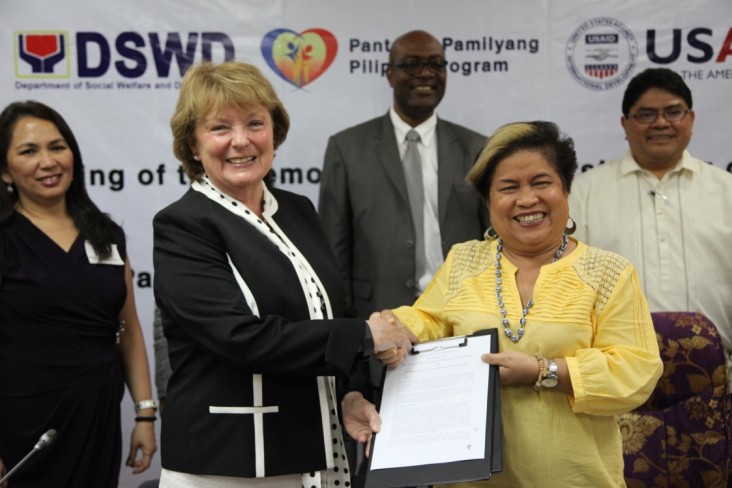
For Immediate Release
The U.S. Government and the Department of Social Welfare (DSWD) entered into a new partnership to improve the lives of the Philippines’ most vulnerable families.
U.S. Embassy Manila’s United States Agency for International Development (USAID) Mission Director Dr. Susan Brems and DSWD Secretary Corazon Juliano-Soliman signed a Memorandum of Understanding today to improve the delivery of government financial services through electronic payment channels.
Under the Partnership for Growth, the Philippines and the United States are working to accelerate and sustain broad-based and inclusive economic growth. Part of this strategy includes promoting financial inclusion among vulnerable populations and introducing efficiencies in government programs. Both USAID and DSWD will train and provide consumer education to Pantawid Pamilya Program (Bridging Program for the Filipino Family) beneficiaries who are shifting from disbursements via cash and cash cards to prepaid debit cards.
“We want our beneficiaries to maximize the use of their cash grants, which is why we always look for economical and convenient means to deliver their grants”, said DSWD Secretary Corazon Juliano-Soliman. “With the shift from cash cards to prepaid debit cards, our beneficiaries will have better and wider options in utilizing their cash grants.”
Since 2009, the DSWD has been improving the health and education of poor households, particularly those with children under 18 years old, through its Pantawid Pamilya Program. The program operates in 18 regions and covers 4.3 million households. DSWD expanded its coverage to include homeless families and those displaced by disasters, indigenous people, and persons with disabilities under the Modified Conditional Cash Transfer (MCCT) Program. In partnership with the Land Bank of the Philippines, DSWD will shift all Pantawid Pamilya beneficiaries to prepaid debit cards from the current mode of disbursement via cash or cash cards. MCCT beneficiaries will be the first to receive disbursements via e-Money-enabled prepaid debit cards.
To ensure that families are made aware of the changes and the benefits of the new debit cards, which include the ability to withdraw from ATMs, pay directly for goods or services, or make a cash-out at LBC Express (previously known as Luzon Brokerage Company) outlets, DSWD and USAID produced information and communications materials to train the first recipients of the prepaid debit cards. The agreement signed today will expand and deepen this training.
“USAID is committed to supporting the Philippine Government to achieve growth that is both inclusive and sustainable,” remarked Mission Director Brems. “We stand with you in taking financial education services to vulnerable families, ensuring that families are able to benefit from an improved payment system that makes it easier to receive government benefits and pay for goods and services.”
“With this partnership, we are not only educating our partner-beneficiaries on the use of the cards, but, more importantly, we are involving them in the entire financial system. This lets them see how they, as consumers, help drive the economic activity in their community that leads to development,” concluded Sec. Soliman.
USAID, through its E-PESO program, works with the government and private sector to achieve a 20-fold increase in e-Payment usage. It supports the development of an economic infrastructure that enables Filipinos to access new financial products.







Comment
Make a general inquiry or suggest an improvement.